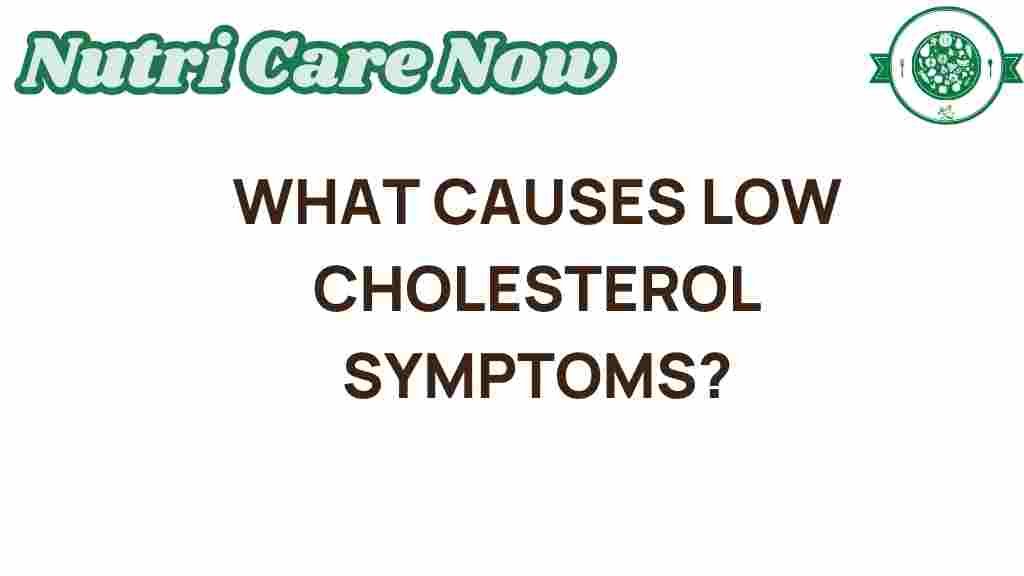Unraveling the Mystery: What Causes Low Cholesterol Symptoms?
When we think about cholesterol, we often hear more about high cholesterol and its associated health risks. However, low cholesterol can also lead to a variety of symptoms and health concerns that are less commonly discussed. Understanding low cholesterol, its symptoms, and the potential impact on heart health is crucial for maintaining overall wellness. In this article, we will explore the causes of low cholesterol, the symptoms to watch for, and how nutrition and lifestyle choices can play a vital role in managing cholesterol levels.
Understanding Cholesterol
Cholesterol is a waxy substance found in your blood that is necessary for building healthy cells. It is produced by the liver and obtained from certain foods. Cholesterol is classified into two main types:
- Low-Density Lipoprotein (LDL): Often referred to as “bad” cholesterol, high levels of LDL can lead to plaque buildup in arteries, increasing the risk of heart disease.
- High-Density Lipoprotein (HDL): Known as “good” cholesterol, HDL helps remove LDL cholesterol from the bloodstream.
While high levels of LDL are harmful, having low levels of HDL or low overall cholesterol can also pose health risks.
What is Low Cholesterol?
Low cholesterol is typically defined as having total cholesterol levels below 160 mg/dL. While this may seem desirable, excessively low cholesterol can lead to a range of health issues, including:
- Hormonal imbalances
- Increased risk of certain cancers
- Neurological issues
- Digestive problems
Causes of Low Cholesterol
Several factors can contribute to low cholesterol levels, including:
- Genetics: Inherited conditions can affect how the body processes cholesterol and lipids.
- Poor Nutrition: A diet very low in fats can lead to decreased cholesterol production.
- Thyroid Issues: Hyperthyroidism can increase metabolism and decrease cholesterol levels.
- Liver Disease: Since the liver produces cholesterol, liver dysfunction can lead to low levels.
- Medications: Certain medications, such as statins or other cholesterol-lowering drugs, can lower cholesterol levels too much.
Symptoms of Low Cholesterol
Identifying the symptoms of low cholesterol can be challenging, as they are often vague and can overlap with other health issues. Common symptoms include:
- Fatigue: Low energy levels and chronic fatigue can be a sign of low cholesterol.
- Hormonal Imbalances: Irregular menstrual cycles in women or erectile dysfunction in men can occur.
- Memory Problems: Low cholesterol may affect cognitive function and lead to memory issues.
- Skin Issues: Eczema or other skin conditions can manifest as a result of low cholesterol.
- Digestive Problems: Cholesterol is essential for producing bile, so low levels may lead to digestive issues.
Health Risks Associated with Low Cholesterol
While many people aim to reduce their cholesterol for better heart health, low cholesterol itself can be dangerous. Research has shown that individuals with low cholesterol may face increased risks for:
- Stroke: Some studies suggest a correlation between low cholesterol levels and an increased risk of hemorrhagic stroke.
- Cancer: There is some evidence that low cholesterol may be linked to higher rates of certain cancers.
- Depression: Low cholesterol levels have been associated with mood disorders and depression.
Nutrition and Diet for Healthy Cholesterol Levels
Managing cholesterol levels through nutrition and diet is crucial for overall health. Here are some dietary recommendations:
- Healthy Fats: Include sources of healthy fats, such as avocados, nuts, and olive oil.
- Omega-3 Fatty Acids: Fatty fish like salmon and mackerel can help maintain balanced cholesterol levels.
- Fruits and Vegetables: These are rich in fiber and essential nutrients that support heart health.
- Whole Grains: Whole grains can help improve cholesterol levels and provide sustained energy.
- Limit Trans Fats: Avoid processed foods that contain trans fats, which can negatively impact cholesterol.
Steps to Manage Low Cholesterol
If you suspect you have low cholesterol or are experiencing symptoms, consider the following steps:
- Consult a Healthcare Professional: Schedule an appointment to discuss your symptoms and get tested for cholesterol levels.
- Review Your Diet: Keep a food diary to assess your current dietary habits and make necessary adjustments.
- Incorporate Healthy Fats: Aim to include more healthy fats in your meals to help boost cholesterol levels.
- Regular Exercise: Engage in physical activity to support overall heart health and well-being.
- Monitor Your Progress: Regularly check your cholesterol levels and consult with your healthcare provider to ensure they remain within a healthy range.
Troubleshooting Low Cholesterol Symptoms
If you’re dealing with symptoms of low cholesterol, here are some troubleshooting tips:
- Stay Hydrated: Dehydration can exacerbate fatigue. Drink plenty of water throughout the day.
- Manage Stress: Implement stress-reducing techniques such as yoga, meditation, or deep breathing exercises.
- Get Enough Sleep: Aim for 7-9 hours of quality sleep each night to aid recovery and overall health.
- Limit Alcohol Intake: Excessive alcohol can impact liver function and cholesterol levels.
Conclusion
In conclusion, understanding low cholesterol and its associated symptoms is essential for maintaining good heart health and overall wellness. While the focus is often on high cholesterol and its health risks, low cholesterol can also lead to significant health problems. By paying attention to your diet, lifestyle, and symptoms, you can take proactive steps to support healthy cholesterol levels. Always consult with a healthcare professional for personalized advice and guidance based on your individual health needs. For more information on heart health, visit this resource and learn how to keep your cardiovascular system in optimal condition.
For further insights into improving your health and wellness, check out our wellness blog for tips and strategies on nutrition and lifestyle changes!
This article is in the category Health and created by NutriCareNow Team

5 thoughts on “Unraveling the Mystery: What Causes Low Cholesterol Symptoms?”